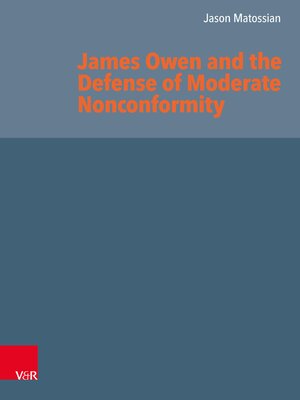James Owen and the Defense of Moderate Nonconformity
ebook ∣ Reformed Historical Theology
By Jason Matossian

Sign up to save your library
With an OverDrive account, you can save your favorite libraries for at-a-glance information about availability. Find out more about OverDrive accounts.
Find this title in Libby, the library reading app by OverDrive.



Search for a digital library with this title
Title found at these libraries:
| Library Name | Distance |
|---|---|
| Loading... |
The period of Revolution and Toleration in England was filled with rapid change, political uncertainty, and ecclesiastical volatility. Still recovering from the strife of Civil War and a divisive Restoration, the relationship between the Church of England and Nonconformists remained deeply strained. Although Dissenters were granted the right to gather for worship under Toleration, their legitimacy was regularly challenged. Within this context, a variety of significant controversies arose in which James Owen, a Welsh Presbyterian minister, played a prominent role and was a leading voice for moderate Nonconformity.
Along with a group of moderate Nonconformist friends like Edmund Calamy, Philip and Matthew Henry, and Francis Tallents, Owen defended a version of Protestant ecumenism. This was a theological conviction that (1) the unity of the Protestant Church was indispensable and (2) this unity was to be found in agreement on essential doctrines, not in sharing ecclesiastical structures. Owen, along with his associates, defended the Dissenters' separation from the Church of England as biblically sanctioned and at the same time emphasized that such separation was not schismatic.
Owen's clear, biblically articulate, and historically informed writing made his contribution to the period of Toleration significant and influential.







